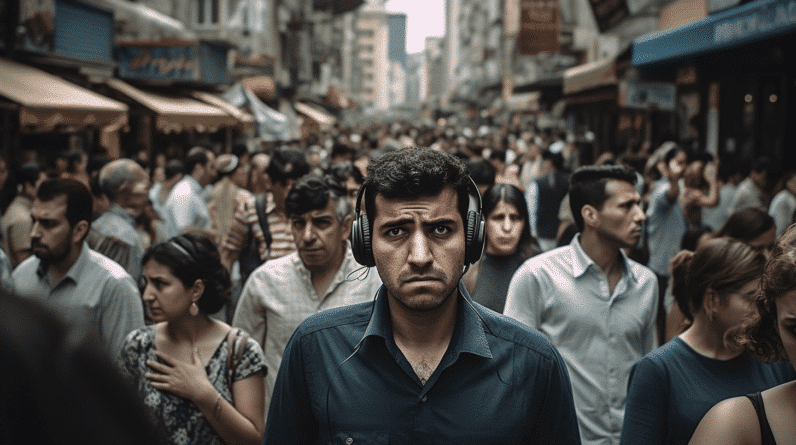
We may earn money or products from the companies mentioned in this post.
As an Amazon Associate I earn from qualifying purchases.
Have you ever experienced a ringing, buzzing, or clicking sound in your ears? These sensations describe a complex condition known as tinnitus. This phantom auditory perception can be quite challenging to live with, affecting sleep, concentration, and overall well-being. Interestingly, certain activities such as flying may exacerbate tinnitus symptoms. This article explores tinnitus in more depth and discusses the relationship with flying.
Understanding Tinnitus
Tinnitus is a perception of sound without an actual external source- a sort of auditory hallucination. The sounds vary widely among individuals and may range from a low roar to a high squeal. Some people even experience pulsatile tinnitus, which is characterized by rhythmic sounds that often match the individual’s heartbeat. Tinnitus can be either subjective (only the patient can hear the sound) or objective (the sound can also be heard by others).
The condition can manifest in a variety of sounds. Common descriptions include ringing, buzzing, whooshing, hissing, and clicking. Furthermore, some individuals describe a period of tinnitus silence where the noise momentarily ceases. Understanding the type and nature of these sounds can potentially aid in defining the underlying causes of the condition and informing treatment strategies.
Link between Flying and Tinnitus
Now, how does flying come into the picture? It’s a commonly asked question among patients whether flying exacerbates tinnitus symptoms. Indeed, traveling, especially via air, can influence tinnitus, often due to pressure changes during take-off and landing. These changes could trigger a worsening of symptoms or a temporary elevation in the severity of the perceived sounds.
When analyzing the dangers of flying with tinnitus, one must recognize that the condition itself does not generally prevent individuals from flying. Nonetheless, the unique conditions encountered during a flight like variations in air pressure, loud engine noise, and other environmental factors, could potentially worsen symptoms for some.
In fact, the term ‘airplane tinnitus’ has been coined to describe tinnitus symptoms or an increase in perceived sounds experienced after a flight. Recurrent flyers often report ear ringing after flight, and many wonder if the airplane’s altitude changes and cabin pressure can heighten tinnitus symptoms. Recognizing the link between flying and tinnitus can help individuals plan and manage their symptoms better while in transit.
Real Experiences: Frequent Fliers and Tinnitus
Tinnitus doesn’t discern between the average individual and famous personalities. Many well-known figures like musicians and actors have publicly revealed their struggles with tinnitus. Among these brave souls, some celebrities who have tinnitus include William Shatner, Moby, and Barbara Streisand. Despite the challenges, these artists have continued their respective careers, which often involve frequent flying for performances and appearances.
Success stories from celebrities as well as everyday individuals suffering from tinnitus demonstrate that travelling is not an insurmountable challenge. By implementing precautionary measures, understanding triggers, and using helpful tools, managing tinnitus, and maintaining a regular flying schedule is entirely feasible.
How to Safely Fly with Tinnitus
People questioning, “can I fly with tinnitus?” should remember that each experience is unique. However, certain measures can significantly assist in creating a comfortable journey. Use ear devices for tinnitus like noise-cancelling headphones or earplugs to reduce background noise, as it can alter the perception of tinnitus.
Techniques that alleviate cabin pressure—like yawning, swallowing, or using a nasal spray—can also help mitigate symptoms and discomfort during the flight’s takeoff and landing phases.
Additionally, making use of a tinnitus sound therapy app could provide some relief. Today’s technology offers various options for ambient and white noise apps designed to help distract the brain and soothe tinnitus effects. Carrying along a quietest tinnitus delivering device can also provide much-needed relief and convenience.
Treating Tinnitus
When it comes to treatment, several proven options can help in managing tinnitus symptoms. One such therapy being tinnitus cognitive behavioral therapy. This method works by changing the way a person thinks about and responds to tinnitus, promoting a healthier psychological response.
Hearing aids for tinnitus have also shown to be beneficial for individuals with hearing loss in conjunction with tinnitus. These devices can amplify ambient sounds, making tinnitus less noticeable.
Moreover, understanding the concept of clarity for tinnitus aids in setting realistic expectations from treatment. Patience and persistence play a significant role in managing and treating tinnitus. So, if you’re wondering can you recover from tinnitus, while the symptoms may not disappear completely, the condition can certainly be managed well enough to lead a relatively undisturbed, quality life.
Conclusion
Navigating the world as a person living with tinnitus is undeniably challenging. Still, dare to add flying into that equation, and you venture into an entirely new territory. However, the good news is, while the journey might be a bit bumpier for individuals with tinnitus, it isn’t impossible.
From this in-depth exploration, it’s fair to conclude that while flying can potentially worsen tinnitus symptoms, it doesn’t pose a significant risk for everyone. Yes, tinnitus and flying is a unique pairing, but understanding tinnitus and knowing how to cater to your symptoms can help transform the flying experience from distressing to manageable. Our accounts of celebrities who have tinnitus and other individuals managing tinnitus and frequent travel should serve as a source of inspiration.
We’re fortunate to live in a time where tools like ear devices for tinnitus or tinnitus sound therapy apps are available to help manage symptoms.
The hope is that armed with the knowledge of potential treatments like hearing aids or cognitive behavioral therapy, and understanding the concept of clarity for tinnitus, those living with tinnitus can reclaim some control over their condition and continue to enjoy the freedom of travel.
The world is vast and beautiful, and tinnitus, though challenging, shouldn’t rob anyone of the joy of exploring it.
Flying And Tinnitus - Frequently Asked Questions (FAQs)
Can flying worsen tinnitus?
Yes, flying might exacerbate tinnitus symptoms for some people. This may be due to changes in cabin pressure during take-off and landing, and the noise from the airplane engines. However, everyone’s experience is unique, and not everyone will have the same reaction.
Can you fly if you have tinnitus?
Yes, individuals with tinnitus are usually able to fly. However, it’s important to take certain measures to make the journey more comfortable. This can include using ear devices designed to alleviate tinnitus symptoms, and practicing strategies for relieving ear pressure.
What causes Tinnitus?
Tinnitus is often caused by damage to the auditory system, typically from exposure to loud noise. However, it can also be a symptom of certain health conditions, like hypertension, allergies, or anemia, and it can be a side effect of some medications.
What treatments are available for tinnitus?
There are a variety of treatments available for managing tinnitus symptoms, from cognitive behavioral therapy to hearing aids designed to alleviate tinnitus sounds. These treatments don’t necessarily eliminate the tinnitus, but they can significantly reduce the distress and discomfort associated with the condition
What are some strategies for managing tinnitus while flying?
Some strategies for managing tinnitus while flying include using noise-cancelling headphones or earplugs to reduce background noise, utilizing a tinnitus sound therapy app which can provide some relief, and practicing techniques to relieve ear pressure during take-off and landing.
Amazon and the Amazon logo are trademarks of Amazon.com, Inc, or its affiliates.
Related posts:
- Unlocking the Secrets of Ear Pain and Ringing: Comprehensive Guide to Causes, Symptoms, and Breakthrough Relief Strategies
- Understanding ADHD and Tinnitus: Is there a Connection?
- ADHD & Tinnitus: Understanding the Complex Link & How to Cope
- The Truth Behind Tinnitus After Ear Infection: Will It Disappear?








